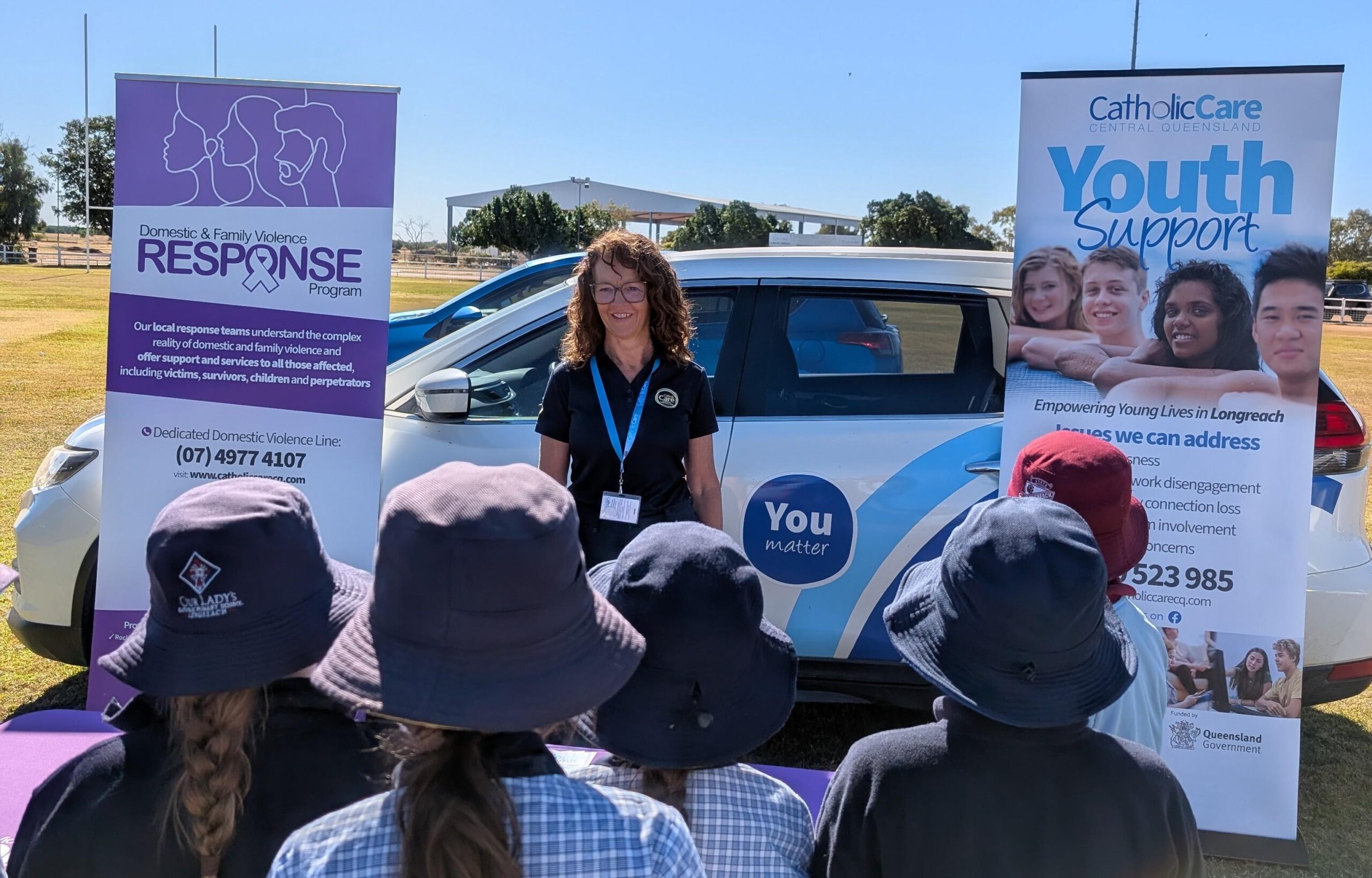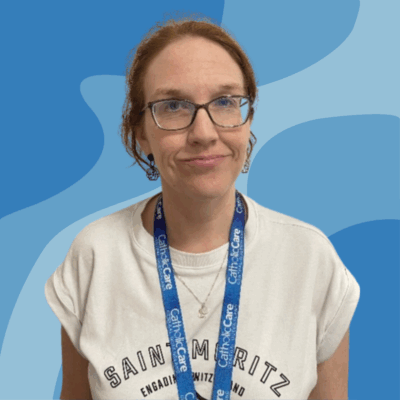Queensland Child Protection Week is a powerful reminder that child protection is everybody’s business.
Held annually in the first full week of September, the week aims to raise awareness of the vital role adults play in keeping children safe from harm and nurtured in supportive environments.
At its heart is a call to action: adults are essential in safeguarding children’s wellbeing, and listening to children and young people is the most important way to support their safety. When children’s voices are ignored, whether through abuse, neglect, violence, or being denied the right to make decisions about their lives, the harm can be lasting.
For many people within our team, this responsibility is woven through their roles, and sits at the very heart of their daily work.
In recognition of Queensland Child Protection Week, we’re proud to share a series of profiles spotlighting some of our team members who walk alongside children, young people, and families every day, working to create safer, stronger futures.
First up, meet Tracey, a Youth Support Worker based in Longreach in Central West Queensland.

Tracey provides tailored support to young people aged 12 to 21 who are at risk of or disengaged from education, employment, family, or community.
Her work is practical and wide-ranging. From helping young people access stable living arrangements and navigate financial support, to encouraging engagement in education or employment and connecting people with health and wellness services, Tracey’s work is about empowering young people to build stronger, safer futures.
Tracey has witnessed young people grow in confidence and stability through her support. She shares that support can range from something as simple as helping a young person apply for a birth certificate, to providing more intensive assistance.
Reflecting on many proud moments she’s had in her work, Tracey recalls a particular outcome that stands out for her.
“I am proud to have assisted a 15-year-old girl navigating a hostile and unstable home environment to move into a kinship care arrangement so that she is still connected to family and remains in school,” she says.
For young people, Tracey says an office isn’t always the easiest place to talk about what’s on their mind. Instead, she meets them where they feel most comfortable, whether walking by the river, taking a drive, or chatting at the local diner.
“I hold a safe space for a young person without judgement to tell their story on their terms.”
Child Protection Week holds deep meaning for Tracey, because for her, child protection is more than a job – it’s a calling.
“Child protection is something I live and breathe. Child Protection Week is an opportunity for the wider community to be reminded that everyone is responsible for protecting children,” she says.
Part of that shared responsibility, Tracey highlights, is about how we respond when children and young people place their trust in us.
“Listen, believe, and act if a child confides in you,” Tracey says.
“Be vigilant – don’t turn a blind eye to child abuse and neglect.”
Next, meet Katie, a Child Inclusive Practitioner and Educator at the Family Relationship Centre in Mackay.

In her role, Katie meets with children whose family are going through mediation. She listens to their experiences, thoughts, and feelings, and shares these insights with caregivers in a way that ensures children’s voices are not only heard, but shape the mediation process in meaningful ways.
Katie also facilitates a range of education programs that are designed to build confidence in parenting, support positive communication, and strengthen family relationships.
Her dual role allows her to work closely with both children and caregivers, supporting families as they navigate some of the most challenging times in their lives.
For the children she meets, Katie’s priority is providing a safe space where they can freely express their feelings and share their concerns without judgement.
“Often when a child comes to see me, it is the first time that they have had an opportunity to express how they are feeling about what is happening within the family,” she explains. “Being able to have their voice heard can be very empowering.”
Katie sees firsthand the positive impact that child-inclusive practice can have on both children and families.
One story that stands out for her is of a young boy who was deeply distressed by his parents’ separation, and whose anxiety was manifesting through excessive tics.
“During my first session with this boy, his ticcing was quite noticeable,” Katie recalls. “But as time went on, and he was given the chance to express his feelings through play, drawing, and conversation, he became noticeably calmer and his tics reduced.”
By giving children the chance to be heard, Katie says that caregivers are often able to see their situation through their child’s eyes and respond with greater empathy and understanding.
“The great thing was that the boy’s parents were willing to try to put their own issues aside and focus on putting parental arrangements in place to reduce their son’t anxiety and stress,” she says.
Child Protection Week holds a special significance for Katie, reflecting both her passion for children’s wellbeing and her collaborative approach.
“For me, it’s an opportunity to get together with other services in Mackay to raise awareness and promote the safety and wellbeing of children in our community.”
Her focus on collaboration extends beyond professionals, calling on individuals and communities to play their part in protecting children.
“By educating ourselves about child abuse and neglect, speaking up if we have concerns, and listening to our children, we can create communities where children feel safe, supported, and have the best possible futures.”
Up next, meet Yeppoon-based Family Relationships Counsellor, Andrew.
Andrew works with individuals, couples, and families to help them navigate challenges, strengthen connections, and build stronger relationships.
He provides counselling and psychotherapeutic care to children, adolescents, and adults, tailoring support to each person’s needs.
For Andrew, the heart of his work lies in creating an environment built on safety and trust.
“One of the most significant opportunities I have when working with children is to create a space in which the child or adolescent feels that their lived experience is valid, that their story is believed, and that they are accepted just as they are.”
He explains that when children feel safe and accepted, they often find the courage to open up about what is really happening in their lives.
“There have been occasions where the rapport and safety that a child has felt within the counselling relationship has given them the courage to share with me experiences of abuse or neglect that they have been exposed to or are currently living with,” Andrew says.
These moments are pivotal, he adds, as disclosures allow support systems to be put in place, which can help people move towards safety and stability.
While supporting children is an important part of his work, Andrew also recognises the profound impact of working with parents. Time and again, he meets adults who are carrying their own unhealed trauma – experiences that inevitably shape how they parent.
“The past never remains in the past, it always influences the present,” Andrew says.
“So many parents are inadvertently parenting their children out of their own wounding.”
Andrew encourages parents to reach out for support in their own healing journey, as the right support can transform their relationship and the way they care for their children.
“If you know that you’re carrying around hurts and wounds from your past, get help dealing with it all. Don’t pass on to your children the pain that was given to you,” he says.
“Talk to your GP, connect with a counsellor, do whatever it takes because your children deserve parents that are parenting from strength not woundedness.
“By healing from their past, parents are better positioned to parent from a place of strength, groundedness and safety, which can only mean good things for their children.”
For Andrew, Child Protection Week is a vital reminder that safeguarding children is a responsibility shared by all of us, and stresses that the responsibility of protecting children doesn’t rest solely with professionals.
“We all know when things don’t feel right. As a community we need to be done with the culture of ‘minding your own business’ where our children and adolescents are concerned,” he says.
“Pay attention and if something feels off to you, let someone know – a teacher, the police, child safety.
“Children are the voiceless in our community, so they need each of us to speak on their behalf.”
To round out our series of team profiles, meet Lorena, a Child Witness Counsellor with our Domestic and Family Violence (DFV) Response team.
Lorena’s work centres on supporting children and adolescents who have experienced or witnessed domestic and family violence.
Through therapeutic interventions, she helps young people heal from trauma while guiding them through the challenges of parental separation and shifting family dynamics.
When asked how she ensures children feel heard and valued during sessions, Lorena reflects that it often begins with the simplest of gestures.
“[It can be] as simple as giving them a genuine smile, being fully present when meeting them, and matching their energy in each interaction [that] can make the difference in building trust and letting them know that they are important and valued.”
Lorena has witnessed many powerful shifts through her work. They’re not always dramatic, she shares, but they are always significant for the children and young people she supports.
“When a young person arrives at their appointment dysregulated, unable to express with words what they’re feeling, yet leaves in a better headspace after using tools and resources from the session to help regulate their emotions and clear up their overwhelming thoughts – to me, that’s a win.”
These “wins”, as she describes them, are reminders of the transformative impact of a safe, supportive space coupled with equipping young people with tools to weather their emotional storms and find clarity even in the hardest times.
Lorena sees Child Protection Week as an opportunity to pause and ask the tough questions that can move us closer to safer communities.
“For me, it’s a time to reflect on both the progress made and the gaps that still exist in the system, to consider our individual contributions toward creating safer environments for children, and to question whether, as a society, we’re truly heading in the right direction.”
She believes that keeping children safe is everyone’s business, and that education across all levels of society is key.
“For parents, this means accessing support services and participating in parenting courses to learn about themselves and their children’s development,” Lorena says.
“For practitioners in the sector and educators, it involves ongoing professional development as well as mentoring and practice supervision.
“For policymakers and government agencies, it requires meaningful collaboration with frontline workers to ensure informed and effective decision-making.”
Above all, Lorena highlights that protecting children comes back to community. Children thrive when they are surrounded by adults who care, listen, and step forward to support them.
“We must remember that it takes a village to raise a child, and we all can make a difference every time we meet a child in a vulnerable situation.”


